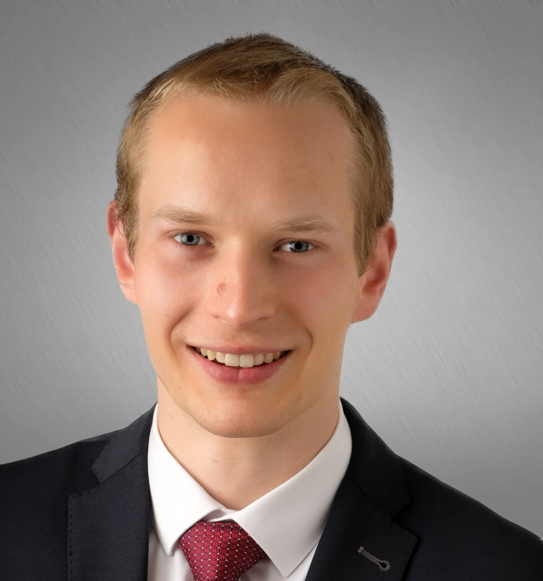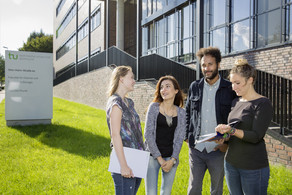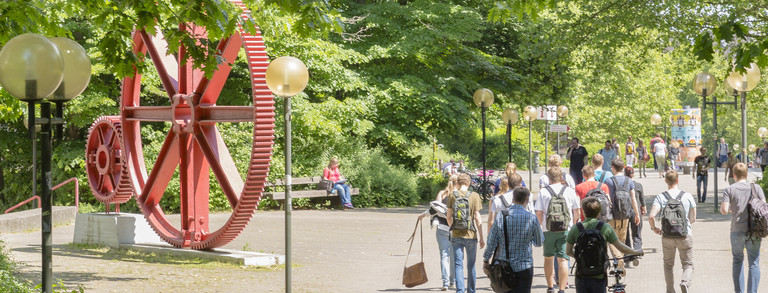Dr.-Ing. Alexander Puzicha
Address
Computer Science IV
TU Dortmund University
D 44221 Dortmund
Phone and E-Mail
Tel.: (+49) 231 755 - 5855
Fax: (+49) 231 755 - 4730
E-Mail: alexander.puzicha (at) cs.tu-dortmund.de
Office
Room 214
Otto-Hahn-Str. 16

Lehrstuhl Informatik 4
TU Dortmund
Otto-Hahn-Straße 16
44227 Dortmund
Deutschland
- 11/20123
PostDoc in the area of autonomous ships: Autonomous Nautic Systems - 10/2019-11/2023
PhD (Dr.-Ing.), Research Training Group 2193, Chair IV: Modeling and Simulation, Faculty of Computer Science, Dortmund University of Technology, Link to Dissertation: Model based control of decentralized systems in unkown environments - 02/2018-09/2019
Master of Science, Computer Science with minor in Electrical Engineering, Dortmund University of Technology, Link to the thesis - 10/2015-02/2018
Bachelor of Science, Computer Science with minor in Electrical Engineering, Dortmund University of Technology, Link to the thesis
- since 10/2019
Research Assistant and PhD Student, Research Training Group 2193, Chair IV: Modeling and Simulation, Faculty of Computer Science, TU Dortmund University - since 07/2020
Commercial skipper for recreational shipping - since 10/2017
Examiner for recreational shipping - since 07/2016
Instructor for recreational shipping
- 2018
Ferdi-Kallmeyer-Preis für herausragende Abschlussarbeiten im Bereich Mechatronik, 2.Place - 2015
Deutschlandstipendium für Bachelor und Master von der Ping Stiftung - 2014
European Cyber Security Challenge, 2.Place (Team Germany)
- Component development for autonomous (inland) shipping
- Navigation sensors and echo sounder systems
- Optimization under uncertainty
- Model predictive control
- Robotics in the field of unmanned vehicles UxV
- Simulation and digital twin
- Research Training Group 2193 "Adaptive Intelligence of Factories in Complex and Dynamic Environments".
2022
A. Puzicha; P. Buchholz (2022): Dynamic Mission Control for Decentralized Mobile Robot Swarms. In: 2022 IEEE International Symposium on Safety, Security, and Rescue Robotics (SSRR). 2022 IEEE International Symposium on Safety, Security, and Rescue Robotics (SSRR), S. 257–263. Dynamic Mission Control for Decentralized Mobile Robot Swarms | IEEE Conference Publication | IEEE Xplore
Puzicha, Alexander; Buchholz, Peter (2022): Mission-based autonomy core for decentralized mobile UGV swarms. In: VDE Verband der Elektrotechnik Elektronik Informationstechnik e.V. (Hg.): ISR Europe 2022 : 54th International Symposium on Robotics in conjunction with: automatica June 20 – 21, 2022, Munich. Unter Mitarbeit von Prof. Dr. Alexander Verl. Berlin: VDE VERLAG GMBH, S. 319–326. Available: Mission-based autonomy core for decentralized mobile UGV swarms | VDE Conference Publication | IEEE Xplore
2021
Puzicha, Alexander (2021): Control of decentralized systems under uncertainty. In: Proceedings of the 2021 Joint Workshop of the German Research Training Groups in Computer Science 2021, S. 44. https://doi.org/10.25593/opus4-fau-16426
Puzicha, Alexander; Buchholz, Peter (2021): A Simulation Environment for Autonomous Robot Swarms with Limited Communication Skills. In: Houbing Song und Dingde Jiang (Hg.): Simulation Tools and Techniques, Bd. 370. Cham, 2021. Cham: Springer International Publishing, S. 206–226. Online verfügbar unter https://doi.org/10.1007/978-3-030-72795-6_17
Puzicha, Alexander; Buchholz, Peter (2021): Decentralized model predictive control for autonomous robot swarms with restricted communication skills in unknown environments. In: Procedia Computer Science (186), S. 555–562. Amsterdam: Elsevier. https://doi.org/10.1016/j.procs.2021.04.176
2020
Puzicha, Alexander; Buchholz, Peter (2020): Real-Time Simulation of Robot Swarms with Restricted Communication Skills. In: 2020 IEEE/ACM 24th International Symposium on Distributed Simulation and Real Time Applications (DS-RT). 2020 IEEE/ACM 24th International Symposium on Distributed Simulation and Real Time Applications (DS-RT), S. 1–8. Online verfügbar unter doi.org/10.1109/DS-RT50469.2020.9213618.
A. Puzicha (2020), "Control of decentralized systems under uncertainty", Dagstuhl 2020 - Gemeinsamer Workshop des Graduiertenkollegs 2340 und des HPI Forschungskollegs
Erik Schulz (2020): Automatisierte Transportmissionsabbildung für eine verteilte nichtlineare modellprädiktive Regelung autonomer Roboterschwärme unter Wissensbeschränkungen. Bachelorarbeit. Technische Universität Dortmund, Dortmund. Lehrstuhl für praktische Informatik.
Kai Leppersjohann (2020): Automatisierte Missionsabbildung für eine verteilte nichtlineare modellprädiktive Regelung autonomer Roboterschwärme unter Wissensbeschränkungen. Bachelorarbeit. Technische Universität Dortmund, Dortmund. Lehrstuhl für praktische Informatik.
Christian Dünnermann (2021): Kartendatenextraktion für eine modellbasierte Echtzeitsimulation. Bachelorarbeit. Technische Universität Dortmund, Dortmund. Lehrstuhl für Computergraphik.
Julian Rütter (2021): Entwurf und Implementierung effizienter Strukturen zum Aufbau einer Potentialkarte aus Sensordaten in Echtzeit. Bachelorarbeit. Technische Universität Dortmund, Dortmund. Lehrstuhl für praktische Informatik.
Tim Falkenhahn (2021): Simulative Analyse von Angriffen auf Routingverfahren in MANETs. Bachelorarbeit. Technische Universität Dortmund, Dortmund. Lehrstuhl für praktische Informatik.
Ritta Nader (2021): Konsens-basierte Logistikmissionen für eine verteilte nichtlineare modellprädiktive Regelung autonomer Roboterschwärme unter Wissensbeschränkungen. Bachelorarbeit. Technische Universität Dortmund, Dortmund. Lehrstuhl für praktische Informatik.
Nicolas Grabenschröer (2021): Rendezvous-basierte Verhaltensstrategien für eine verteilte nichtlineare modellprädiktive Regelung autonomer Roboterschwärme unter Wissensbeschränkungen. Bachelorarbeit. Technische Universität Dortmund, Dortmund. Lehrstuhl für praktische Informatik.
Thushanth Elanko (2021): Transportkettenentwicklung für eine verteilte nichtlineare modellprädiktive Regelung autonomer Roboterschwärme unter Wissensbeschränkungen. Bachelorarbeit. Technische Universität Dortmund, Dortmund. Lehrstuhl für praktische Informatik.
Florette Witzel (2021): Angriffs- und Abwehrstrategien auf mobile Ad-hoc-Netzwerke autonomer Roboterschwärme. Bachelorarbeit. Technische Universität Dortmund, Dortmund. Lehrstuhl für praktische Informatik.
Otman Toul (2021): Automatisierte Typenverteilung autonomer Roboterschwärme unter Wissensbeschränkungen. Bachelorarbeit. Technische Universität Dortmund, Dortmund. Lehrstuhl für praktische Informatik.
David Kaluzny (2021): Adaptive Multiskalenrepräsentation von geotopologischen Karten für modellbasierte Echtzeitsimulationen. Bachelorarbeit. Technische Universität Dortmund, Dortmund. Lehrstuhl für praktische Informatik.
Abdulrazzak Shaker (2021): Autonome Durchführung bodenvorbereitender Maßnahmen für Bauvorhaben mittels eines Roboterschwarms unter Wissensbeschränkungen. Bachelorarbeit. Technische Universität Dortmund, Dortmund. Lehrstuhl für praktische Informatik.
Julian Maczuga (2022): Entwicklung eines realen mobilen ad hoc Netzwerks auf „LoRa“-Basis für Steuerungsdaten eines dezentralen Roboterschwarms unter Wissensbeschränkungen. Bachelorarbeit. Technische Universität Dortmund, Dortmund. Lehrstuhl für praktische Informatik.
Yannis Klindworth (2022): Entwicklung eines energiegewahren Verhaltens für eine verteilte nichtlineare modellprädiktive Regelung autonomer Roboterschwärme unter Wissensbeschränkungen. Bachelorarbeit. Technische Universität Dortmund, Dortmund. Lehrstuhl für praktische Informatik.
Frederick Maaßen (2022): A Comparison of Fast-Recovery Mechanisms in Networks. Bachelorarbeit. Technische Universität Dortmund, Dortmund. Lehrstuhl für praktische Informatik.
Erkan Kement (2022): Vergleichende Analyse Gradienten- und Stützstellen-basierter modellprädiktiver Regler für reale Roboterschwärme. Bachelorarbeit. Technische Universität Dortmund, Dortmund. Lehrstuhl für praktische Informatik.
Olgierd Walter Grajoszek (2022): Reinforcement Learning-gestützte Bewegungsplanung von Aktoren. Bachelorarbeit. Technische Universität Dortmund, Dortmund. Lehrstuhl für Computergraphik.
Hamza Oulahrir (2022): Konsens-basierte Logistikmissionen für eine verteilte nichtlineare modellprädiktive Regelung autonomer Roboterschwärme unter Wissensbeschränkungen. Bachelorarbeit;. Technische Universität Dortmund, Dortmund. Lehrstuhl für praktische Informatik.
Ingo Eigenseher (2023): GPU basierte Parallelisierung stützstellenbasierter nichtlinearer modellprädiktiver Regler für autonome Roboterschwärme unter Wissensbeschränkungen. Bachelorarbeit. Technische Universität Dortmund, Dortmund. Lehrstuhl für praktische Informatik.
Alexander Gerwins (2023): Globale Pfadplanung im komplexen Umfeld für eine verteilte nichtlineare modellprädikative Regelung autonomer Roboterschwärme unter Wissensbeschränkungen. Bachelorarbeit. Technische Universität Dortmund, Dortmund. Lehrstuhl für praktische Informatik.
Florian Barczik (2023): Entwurf einer tretraedischen Driftkompensation für präszise Positionierung und Lagerkennung mittels IMU und GPS. Bachelorarbeit. Technische Universität Dortmund, Dortmund. Lehrstuhl für praktische Informatik.
Erdogan Seref (2023): Entwicklung und Optimierung eines mathematischen Modells für Pick-und-Place-Roboter mit isochroner Kinematik. Bachelorarbeit. Technische Universität Dortmund, Dortmund. Lehrstuhl für praktische Infromatik.
Zinan Ji (2023): Entwicklung und Analyse von Vergleichstests für Open Motion Planning Library (OMPL) und Advanced Control Particle Belief Propagation (ACPBP). Bachelorarbeit. Technische Universität Dortmund, Dortmund. Lehrstuhl für praktische Informatik.
Allkanjari, Kristiana (2023): Autonome logibasierte Analyse schifffahrtsrechtlicher Situationen. Bachelorarbeit. Technische Universität Dortmund, Dortmund. Lehrstuhl für praktische Informatik.
Iqbal, Mobeen (2023): Development and Multi-Level Simulation of Distributed Nonlinear Model Predictive Control for Ground Based Mobile Robot Swarms on Embedded Systems. Masterarbeit. Technische Universität Dortmund, Dortmund. Lehrstuhl für praktische Informatik.
Murthi, Ramesh (2023): Development of ROS2-based Multi-Level Simulation for Tracked Vehicle Robot Swarms. Masterarbeit. Technische Universität Dortmund, Dortmund. Lehrstuhl für praktische Informatik.
Katan, Dennis (2023): Logikbasierte Analyse schifffahrtsrechtlicher Situationen für autonome Schiffe. Bachelorarbeit. Technische Universität Dortmund, Dortmund. Lehrstuhl für praktische Informatik.
Hemdi, Ghazi (2024): Edge filtering of sonar data with the help of machine learning. Bachelorarbeit. Technische Universität Dortmund, Dortmund. Lehrstuhl für praktische Informatik.
Wettklo, Veit-Laurin (2024): Sensordatenanalyse einer tetraedrischen Driftkompensation für präzise Positionierung und Lageerkennung mittels IMU und GPS. Bachelorarbeit. Technische Universität Dortmund, Dortmund. Lehrstuhl für praktische Informatik.
Pazarci, Utku (2024): SLAMwith sonar data for autonomous inland vessels. Masterarbeit. Technische Universität Dortmund, Dortmund. Lehrstuhl für praktische Informatik.
Ben Hmida, Rami (2024): Automatic emission and detection of sound signals for marine navigation. Bachelorarbeit. Technische Universität Dortmund, Dortmund. Lehrstuhl für praktische Informatik.
Final theses in the new research field of autonomous inland ships and navigation
Topics and suggestions can be found on the project page: Autonomous Nautic Systems
If you have your own ideas, you are also welcome to contact me.
The theses can be worked on as BA-/MA theses, depending on the scope. Theses are offered in German or English.
Contact person and editorially responsible: M.Sc. Alexander Puzicha, Wiss. Mitarbeiter





